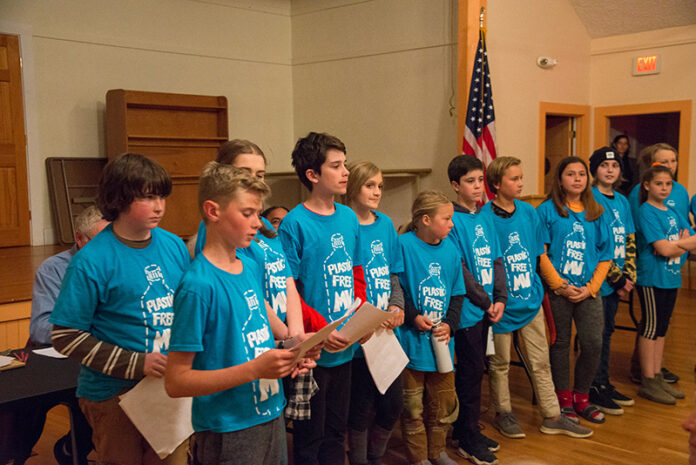
Plastic Free MV is a group of young student activists fighting to reduce plastic waste on the Vineyard; they are making waves here and across the country, creating the first plastic bottle ban of its kind, and inspiring many to be more conscious consumers.
It started with the plastic straw ban initiative, led by predecessors of Plastic Free MV. In 2018, West Tisbury voters agreed unanimously to incur a fine for purposefully releasing lighter-than-air balloons for celebratory purposes.
The plastic bottle ban came in the form of a town bylaw banning the sale of noncarbonated, unflavored water, and soft drinks in plastic bottles less than 34 ounces. The first violation results in a written warning, the second incurs a $50 fine, and subsequent violations are $100.
It all began when Emma Bena, one of the Plastic Free MV student members, went to a public forum at the West Tisbury library about eliminating plastic water bottles from sale by local businesses.
Emma said many people in the room talked extensively about long-term sustainability goals for Martha’s Vineyard, but very little was said about what could be done now.
“Why would we want to wait to start doing something about this problem?” Emma asked. “This issue is here, and it won’t wait for us to come up with drawn out solutions.”
Emma said that in order to make a difference, people should put their ideas into action without delay. “I hear a lot about what we can do in the next couple years, but we don’t have a lot of time; this situation is serious,” Emma told us.
A group of students was organized with the help of West Tisbury school teacher Annemarie Ralph to brainstorm and work toward immediate goals of waste mitigation.
Another student activist and member of Plastic Free MV, Rodeo Purves-Langer, said that his generation is going to have to live with the consequences of the decisions that have been made and will be made in the near future.
“People think, ‘Oh, climate change isn’t going to affect me, so it doesn’t matter.’ They aren’t thinking about future generations,” Rodeo said.
Next steps for the group, Ralph said, may include funding from a state sustainability award, and a full-length film created by Thomas Bena (Emma’s father) documenting the process of making Island businesses plastic-free.
One recent development in the kids’ fight for a more sustainable Island is the Plastic Free MV water bottles being distributed to Vineyard sports teams and other local groups.
In order to address issues associated with banning plastic single-use bottles, the Take Back the Tap initiative allows folks to fill up their reusable bottles with fresh, filtered water.
Across the Island, water bottle refill stations have been installed by the Vineyard Conservation Society at community centers, public offices, and other local hubs.
The Plastic Free MV bottles have a quick-response code (QR code) that thirsty Islanders and visitors can scan to find water bottle refill stations on an interactive digital map.
Plastic Free hopes to stock a distribution center with water bottles, shirts, portable stainless steel cups, and more.
Ralph said the possible impact the group could have on the world is limitless.
“We are really setting our goals high, and trying to change the way people think and act,” Ralph said.















